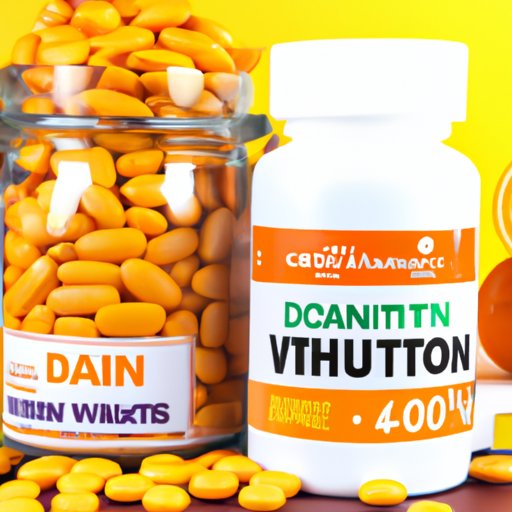
I. Introduction
In recent years, Vitamin D has become synonymous with good health. Known as the sunshine vitamin, it is essential in building strong bones, helping the immune system function optimally, and improving overall health and well-being. However, what happens when we consume too much Vitamin D? How does it affect our health and what are the potential risks? In this informative article, we explore the topic of excess Vitamin D consumption, the potential risks associated with it and how to avoid overconsumption.
II. Understanding the Risks of Excess Vitamin D
Vitamin D toxicity, also known as hypervitaminosis D, occurs when the body has too much Vitamin D. This can be the result of an excessive intake of supplements, fortified foods or sunlight. The recommended daily intake is 400-800 IU, and exceeding the upper limit of 4,000 IU per day can lead to a range of health concerns.
The symptoms of too much Vitamin D can include stomach cramps, nausea, vomiting, constipation, fatigue, and weakness. The consumption of excessively high doses over a prolonged period can lead to more severe health concerns such as permanent kidney damage, abnormal calcium deposits in soft tissues, and heart or blood vessel damage.
To prevent these health complications, it is crucial to monitor Vitamin D intake and even more important if you have certain health conditions such as kidney disease. Consult with a healthcare professional to ensure monitoring Vitamin D levels and proper supplementation.
III. How to Avoid Overdosing on Vitamin D
The body can synthesize Vitamin D through sunlight exposure, and it is also found in certain foods such as fatty fish, eggs, fortified cereals, and dairy products. Following a balanced diet and moderate exposure to sunlight is often ample for most people to meet their Vitamin D requirements. Consider taking supplements only if prescribed by a healthcare professional or if there is insufficient intake from food and sunlight based on individual requirements.
If it is necessary to take supplements, it is essential to consult with a healthcare professional before beginning to avoid exceeding the safe and recommended limits. It is also important to read the labels of supplements carefully and always measuring the recommended dosage with care.
IV. The Science Behind Vitamin D and its Harmful Effects
Vitamin D is a critical nutrient that plays a vital role in maintaining strong bones, teeth, and muscles. It also promotes healthy brain function, helps kickstart the immune system, and decreases the risk of disease. However, excessive Vitamin D consumption can cause dangerous side effects.
Research suggests that Vitamin D toxicity can be linked to many health conditions such as hypercalcemia, renal function decline, high blood pressure, and heart disease. Therefore, it is essential to maintain a healthy balance, and if there is any doubt, discuss supplementation with a healthcare professional.
V. Vitamin D Toxicity: Causes and Treatment Options
Vitamin D toxicity can result from prolonged and excessive intake of Vitamin D supplements or its precursors, other causes of Vitamin-D related medical conditions, or an unintentional overdose which can be life-threatening.
The symptoms may include vomiting, nausea, abdominal cramping, excessive sweating, dehydration, confusion, and kidney damage. Treatment for Vitamin D toxicity depends on the severity of the condition and underlying causes. Treatment options may include reducing Vitamin D intake, sunlight exposure, or hospitalization in extreme cases.
If you suspect a Vitamin D overconsumption or toxicity, seek immediate medical attention to identify the underlying cause and determine the severity of the illness.
VI. The Dark Side of Vitamin D: Debunking Common Myths
While Vitamin D can have many benefits for overall health, there is also a dark side, especially for individuals living in certain demographics or with certain medical conditions.
For instance, individuals with a history of kidney disease, sarcoidosis or other granulomas, HIV, and bariatric surgery are at higher risk of Vitamin D toxicity. Moreover, some people might have heard that more Vitamin D is better, but this isn’t the case as an excessive intake can cause more harm than good. Therefore, it is advisable to maintain a healthy balance and to follow healthcare advice.
VII. Conclusion
It’s clear that Vitamin D is essential for good health, but it’s equally important to understand the risks of overconsumption. Excessive intake of Vitamin D can lead to severe health complications that can be detrimental to our health. Therefore, it is necessary to monitor Vitamin D intake and know its proper limits. Ensure that you have a conversation with a healthcare professional for individualized healthy practice and preventive measures to avoid overconsumption of Vitamin D.





